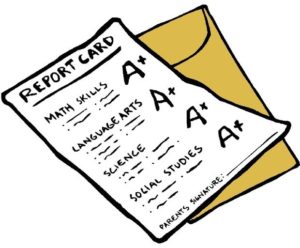What Do Grades Mean
 The following is highly contentious. Many of the situations discussed here should ultimately be considered on an individual basis. The purpose of this is not to create a rubber-stamp solution to all problems that arise with grade assignment and student ability and or performance, but is to provide a general framework so that those individual decisions can be made in fairness and with respect to what is best for the student.
The following is highly contentious. Many of the situations discussed here should ultimately be considered on an individual basis. The purpose of this is not to create a rubber-stamp solution to all problems that arise with grade assignment and student ability and or performance, but is to provide a general framework so that those individual decisions can be made in fairness and with respect to what is best for the student.
In a previous post I asked about a student in summer school that obviously knew Algebra 1 (he earned 100% on his quizzes and tests), but failed during the year because he didn’t do his classwork. The question is, Does he deserve to fail Algebra 1?
When you flip the situation around it is equally interesting. There are many kids who work hard, but do not really understand or learn the math. Do they deserve to pass based on the merits of effort?
The real issue with both of these situations is what grades mean, or what should they mean. When I worked at Cochise Community College I adopted their definition of letter grades which is described below:
A – Mastery
B – Fluency
C – Proficiency
D – Lacking Proficiency
Those are clean and inoffensive definitions of grades. A student with an A has mastered the material. To be fluent means you can navigate the materials but not without error. To be proficient means you can get the job done, but there are some gaps in ability, but the student can demonstrate a measurable level of command of all of the objectives. Students who earn a D are not able to demonstrate proficiency.
A student who struggles with the material does not deserve an A, even if they worked harder than those who earned an A. This might seem unfair, but unless the objective of the class is to teach the value of hard work, to reward the hardworking, but barely proficient, student with a label of mastery is to cheat the student and cheapen the merit of your class.
Do these definitions mean that a lazy kid that get 95% on the final exam deserves an A, but that a hard working kid that gets a 52% on the same final deserves an F? I say, with a few qualifications, yes.
Is this really fair to the student who works hard but has not yet realized an appropriate level of mastery to be awarded a passing grade? (I used the phrase, “has not yet,” instead of, “cannot,” to acknowledge the belief that students can learn, and if they are motivated and working, the only question will be the time scale of when they learn the material.)
I would say, for a math class, that the best thing that can happen is they are awarded the appropriate grade, an F. Consider if this student is given a passing grade and the class is a prerequisite course? They’re truly set up for failure in the subsequent class.
There is perhaps no worse example of bad teaching that remains within legals bounds than to inappropriately assign grades to students. If a student deserves a C based on ability, but is given an A based on effort, they will believe they are doing everything right and do not need to improve in order to achieve similar success in subsequent courses.
But to give a student who possesses mastery a failing grade in a class because of lack of work ethic is to teach the student that passing classes is a matter of compliance. Behave and you’ll be rewarded. Those kids are taught that grades are not a reflection of knowledge or ability, and that means that education is not about learning. To me, this is an injustice.
I do not believe in the efficacy of these objective lessons. That would be, failing a student based on the notion that they do not deserve to pass because they are lazy. I believe that given meaningful and challenging opportunities, most of these highly intelligent, but seemingly lazy, students will show themselves to be hard working with amazing focus and direction and incredible capacity for quality work.
What about percentages. Is it appropriate that an 80% is a B, if a B means fluency?
When I first began teaching I would have said, absolutely, a student does not deserve an A if they scored an 87% on their test. Since then I’ve changed my mind. Some topics require higher than 90% accuracy to be awarded an A, while with other topics, mastery might be far below 90%.
The level of complexity, variability of solutions and length of assessment all must be considered. This is why sometimes a grading rubric is far superior to assigning grades based on a percentage of correctness or completion.
 I teach a curriculum that is designed and tested by Cambridge University, the IGCSE test is what students take. They have a very different way of assigning and defining grades than we use here in the United States. Without going into details about how they do the specifics, they assign large portions of credit based on evidence of appropriate thinking. In other words, if a student demonstrates understanding they will receive passing credit. But, to achieve a high grade, mastery is truly measured. And yet, in math at least, the percentages of correctness for mastery are usually in the mid-70’s. This is because the nature of the questions asked are often non-procedural and the method of solution is not clear, students cannot be trained on how to answer the questions they face on IGCSE exams.
I teach a curriculum that is designed and tested by Cambridge University, the IGCSE test is what students take. They have a very different way of assigning and defining grades than we use here in the United States. Without going into details about how they do the specifics, they assign large portions of credit based on evidence of appropriate thinking. In other words, if a student demonstrates understanding they will receive passing credit. But, to achieve a high grade, mastery is truly measured. And yet, in math at least, the percentages of correctness for mastery are usually in the mid-70’s. This is because the nature of the questions asked are often non-procedural and the method of solution is not clear, students cannot be trained on how to answer the questions they face on IGCSE exams.
How Do Students Earn Grades
 How a student can earn a grade varies, or should, depending on subject and age, and perhaps even minor topic within the subject. I believe that separating student work into weighted categories is an appropriate method of helping make transparent to the student how their grade will be assigned. It also by-passes the tricky question of, “What is a point?” For me, a homework assignment is worth 5 points, they’re assigned daily, except Fridays, for a total of 20 points for the week. Yet, a quiz might only be worth 12 points, but will be a far more accurate representation of student’s ability on the topic.
How a student can earn a grade varies, or should, depending on subject and age, and perhaps even minor topic within the subject. I believe that separating student work into weighted categories is an appropriate method of helping make transparent to the student how their grade will be assigned. It also by-passes the tricky question of, “What is a point?” For me, a homework assignment is worth 5 points, they’re assigned daily, except Fridays, for a total of 20 points for the week. Yet, a quiz might only be worth 12 points, but will be a far more accurate representation of student’s ability on the topic.
By assigning weights to the categories, this can be easily balanced. This begs the question, how do you weight the categories?
But what about the student who works, performs all assigned tasks, but can only demonstrate a level of understanding best described as “Lacking Proficiency?” Shouldn’t hard work be rewarded?
And whatever your beliefs on these questions, would your opinion change depending on the age of the student, or perhaps the subject? Should a Chemistry student be rewarded for effort in the same way they’d be rewarded for effort in a Dance class?
At some point, nobody cares about potential or effort. If a child’s mother wants his room clean, she knows he has the potential to clean it, but if he fails to do so, the potential matters not. And if he’s really trying to get it done, but cannot master the discipline to carry through the task, does the effort really matter?
Here is how I set up my grades for high school. It is nuanced and complicated, but I’ll give the outline. Note that for college classes I use a different system.
In high school I weigh categories of grades and have changed the percentages and categories over time until I settled on what seems to work best. These work for my students because it seems to motivate the lazy-smart students and also rewards the hardworking – low aptitude student, because if they remain persistent, they will learn.
Tests – 40%
Quizzes – 25%
Homework – 25%
Other – 10%
I believe extra credit should be awarded for students that perhaps help others, or for extraordinary performance. However, a student should NOT be allowed to raise their grade through extra credit. That is, at the end of the term a student is given a pile of work, that if performed, will raise their grade. This is bad teaching!
The difference between a quiz and a test is similar to the difference between a doctor’s check-up versus an autopsy. The quiz is a chance to see how things are going and adjust accordingly. The test is final. In high school I award credit for homework based on completion, but do not accept late homework.
 Rewarding Effort?
Rewarding Effort?
While I wish that effort equaled success, it doesn’t always work that way…depending on how you define success. For example, I can try as hard as possible to paint a world-famous landscape, but will likely fail if my measure of success is producing a world-famous piece of art. That said, I believe there is a reward beyond measure only discovered with true effort. Our potential, our best, is not static, it changes. It changes in respect to our current level of effort. We can never fulfill our potential, you see. It is always slightly above how hard we are trying. So, if you’re not really trying, your potential decreases, but if you’re pushing your limits, the limits themselves stretch. That is the real downfall of those with an inherent talent that never learn to push themselves. Their potential decreases, dropping down to just higher than their level of effort.
I greatly reward effort, encourage it and makes positive examples of how effort promotes success. However, I do not assign grades to effort. How hard someone needs to try in a given subject to be successful varies entirely upon the student’s aptitude. And suppose you have a truly gifted student, they could be great, if they learn to work hard, right?
Well, perhaps, but there’s more than work ethic involved in greatness. What role does passion play? Take a great young musician and over-structure their training and practice, they’ll burn out. You’ll snuff their passion.
Grades
 I asked the boy whose situation started this whole conversation if he felt he deserved to be in summer school. Before he answered I explained that I didn’t have an expected answer, I didn’t really know if he belonged in summer school or not. Without hesitation, he said he did deserve summer school, because, he said, he was lazy.
I asked the boy whose situation started this whole conversation if he felt he deserved to be in summer school. Before he answered I explained that I didn’t have an expected answer, I didn’t really know if he belonged in summer school or not. Without hesitation, he said he did deserve summer school, because, he said, he was lazy.
So maybe the kid will learn that if he’s lazy he gets punished. But he also learns that grades are arbitrary, with respect to ability.
I do not like objective lessons, do not believe them to be effective. I prefer a punishment that fits the crime, but also one that redirects the offender, allows them to correct their action.
I cannot say in this child’s case specifically, I was not there and I am not judging his teacher, but perhaps a quicker punishment that redirected him could have also taught him that being lazy was unacceptable and at the same time also allowed him to see grades as a reflection of his abilities.
All that said, this is highly contentious and varies incredibly depending on particular situations of students.
Let me know what you think, agree or disagree. Leave me a comment.



